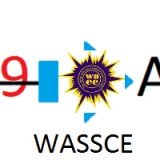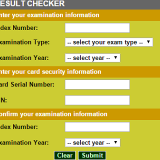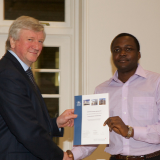Are you planning to sit for the International English Language Testing System (IELTS) to travel abroad to settle, work or study? If yes, then this page provides essential information about the English Language test and links to IELTS resources that help you prepare to achieve high marks on the test without unnecessary stress. This is in line with our vision inspire and support individuals (especially in Sub-Saharan Africa) in their quest to self-actualisation through education.

Resources Links
The table below contains links to our essential and popular resources on preparing for the IELTS.
| Title/Link | Information |
| Essential Information About the IELTS | This is a link to the section on this page that covers all the essential information you need to know about the IELTS Academic and General Training Test including how to register for the test. |
| How to Prepare for the IELTS | Do you care to know what steps you need to take to prepare for the IELTS? If yes, then this post is for you. It contains actionable tips on how to achieve a high score on the test. |
| IELTS vs TOEFL | Are you confused about whether to sit for the TOEFL or IELTS? Then this post is for you. It contains information on the differences between IELTS and TOEFL and enables you to make a better decision on which of the exams to write. |
| 200+ IELTS Speaking Test Sample Questions | Do you struggle with the IELTS speaking test module or do you find it very easy? Then you may want to read this article. Often times students who assume they have a good grasp of the English Language struggle with some speaking test questions many of which are mentioned in this article with over 200 IELTS speaking test sample questions. The best part is some of the questions in the list have been asked on the actual test. |
About the IELTS Test
IELTS is short for International English Language Testing System. It is a test designed to test the English language ability of individuals from countries where English is not the first language(non-native English-speaking countries).
IELTS Acceptability and Recognition
IELTS
IELTS Band Score Scale
| Score | Meaning |
| 9 | Expert User |
| 8 | |
| 7 | Good user |
| 6 | Competent User |
| 5 | Modest User |
| 4 | Limited User |
| 3 | |
| 2 | Intermittent user |
| 1 | Non user |
| 0 | Did not attempt the test |
IELTS Test Format
IELTS is available in two test formats which candidates can choose from depending on the purpose of writing the test.
1). IELTS Academic Test
This test format is usually for those who want to apply for professional registrations or for tertiary institutions in an English-speaking environment.
2). IELTS General Training Test
This test format is usually for employment or migration purposes.
Components of the IELTS Test
Listening Test
The listening module is a 30 minutes test plus an additional 10 minutes for the candidate to transfer the answers to an answer sheet.
It comprises 4 sections, with ten questions in each section.
Section 1: Is a conversation between two people.
Section 2: Is a monologue in an everyday context. For example: a speech about a conservation park, music, local facilities, etc.
Section 3: Is a conversation with up to 4 people. For example: The conversation may be between 2 students discussing a project, or between a teacher and a student discussing an assignment.
Section 4: Is a monologue on an academic subject. For example: in music, university lecture, etc.
Maps/ diagram completion (labelling)
Form
completion No te completionTable completion Flow-chart completion Sentence completion Summary completion
Note: Test takers will lose marks for incorrect spelling and grammar.
Reading
The reading test module is a 60 minutes test comprising three sections and texts totalling about 3000 words taken from magazines, newspapers, books, journals and more.
Identifying a writer’s views/claims (Yes/No/Not Given/True/False)
Matching information
Matching headings
Matching features
Matching sentences endings
Sentence completion
Summary completion
Summary completion
Note completion
Table completion
Flow-chart completion
Diagram label completion
Note:
Writing
The writing module is a 60 minutes test with 2 tasks.
Task 1 requires you to write an essay of at least 150 words and Task 2 requires candidates to write an essay of at least 250 words.
In both tasks,
- Content,
- The organisation of ideas,
- The accuracy and range of vocabulary and grammar.
Academic Writing
In task 1, depending on the task type,
In task 2, depending on the task type,
General Training Writing
In task 1 depending on the task type, you
In task 2,
Marking
Speaking
The speaking module is a 11-14 minutes test with 3 parts.
Part 1: Introduction and Interview
This usually takes about 4-5 minutes.
Here the examiner introduces himself / herself and asks you to introduce yourself. He is to confirm your identity. He or she then
Part 2: Individual Long Turn
Here the examiner gives you a tasks card which asks you to talk about a particular topic and which includes points you can cover in your talk. The examiner could also choose tell you a topic to talk about instead of giving you a task card.
You
The examiner may then ask you one or two questions on the same topic.
This part usually takes about 3-4 minutes.
Part 3: Two-Way Discussion
Here the examiner asks further questions
- Your ability to communicate opinions, and information on every topics and common experiences and situations by answering a range of questions.
- Your ability to speak at length on a
given topic using theappropriate language and organising ideas coherently. - Your ability to express and justify opinions and to
analyse discuss and speculate about issues.
How to Register for the IELTS
Registering for the IELTS takes 3 steps.
Step 1: Find Your Nearest Test Location
There are over 1600 IELTS test locations in over 140 countries which means there is likely a test location near you. You can find the nearest test location from the IELTS official site.
Step 2: Register
You can register for the IELTS online or print and complete the application form and submit it to your local test centre.
Note: You will be required to provide a copy of a valid identity document (for example, your international passport). You will present the same identity on the test date.
Step 3: Receive a Confirmation
You will receive a written confirmation from the centre once your application is processed. The speaking and written test are usually written on the same day.















